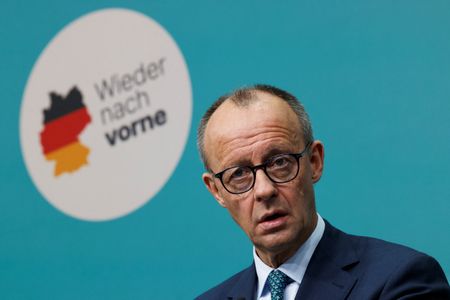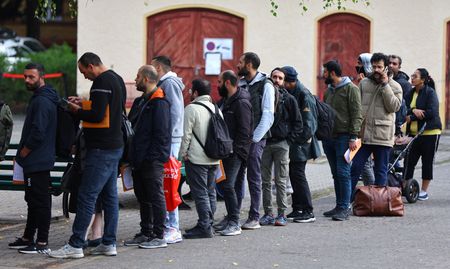By Ludwig Burger and Rachel More
BERLIN (Reuters) – Germany’s government and opposition parties duelled on Monday over rival border control policies, with opposition leader Friedrich Merz, favourite to become next chancellor, saying he would advance his plan with the help of the far right if needed.
Merz called for tighter border controls and more police powers, a signal he is putting migration at the heart of his election campaign in a bid to counter the far right, whose anti-immigrant theme has been magnified by a fatal stabbing for which a failed asylum seeker has been arrested.
The stabbing is the latest in a string of violent attacks in Germany that have boosted public concerns over security and fuelled support for the nationalist Alternative for Germany (AfD) party. The suspect had been undergoing psychiatric treatment.
Merz said Chancellor Olaf Scholz’s Social Democrats and their Green coalition partners should take the blame if they forced him to rely on AfD legislators to get his bill through.
“It’s up to the SPD and the Greens and the liberals to prevent majorities that none of us want,” he told a news conference at his Christian Democratic (CDU) party’s headquarters.
Merz could garner enough votes to pass his proposal since Scholz’s coalition lost its governing majority after the liberal Free Democrats walked out late last year, leaving all parties free to compete for legislative hegemony until the election on Feb. 23,
Scholz’s minority government countered with proposals of its own. Interior Minister Nancy Faeser said, after consulting with regional ministers, she wanted to pass a law implementing the European Common Asylum system and give the police more powers to patrol borders.
“We have to act from the democratic centre,” she said in a statement, which did not mention Merz’s proposals.
‘TICKING TIME BOMBS’
Merz accused Scholz of inaction, saying it had been five months since the last deportation flight to Afghanistan.
“There are 40,000 asylum applicants who need to be deported,” Merz told reporters. “A local politician told me this weekend that there are ticking time bombs walking around our towns and communities.”
Merz’s critics say he risks dismantling the firewall Germany’s mainstream political parties have erected against the far right if he wins a parliamentary motion thanks to AfD backing.
Foreign Minister Annalena Baerbock said Merz’s proposal for permanent border controls within the European Union’s Schengen passport-free travel zone was unworkable and a betrayal of Germany’s responsibility to EU partners.
“If we start doing this, Europe breaks down,” Baerbock, a member of the Greens, told reporters in Brussels.
Founded over a decade ago by right-wing economists who opposed the EU single currency, the AfD has increasingly focused on the supposed threat of immigration to Germany’s identity.
So far all mainstream parties have refused to govern with the AfD, confining it to opposition even after it scored a series of record gains in regional elections this autumn.
The AfD is running second in pre-election polls, behind the conservative bloc.
The border control gambit is not without risks for Merz, who could alienate centrist supporters if he ends up handing the far right a propaganda coup by relying on their support to pass an anti-migration law.
His original pitch to lead the conservatives was that he could “halve” the far right in opinion polls by winning back their voters.
He has not been wholly successful. When he assumed the CDU chairmanship in 2022, the AfD was polling on 10% and the conservative bloc on around 25%. Now the AfD is pushing 20%, while the conservatives have added just five points.
(Reporting by Ludwig Burger and Rachel More; writing by Thomas Escritt; editing by Mark Heinrich and Christina Fincher)










